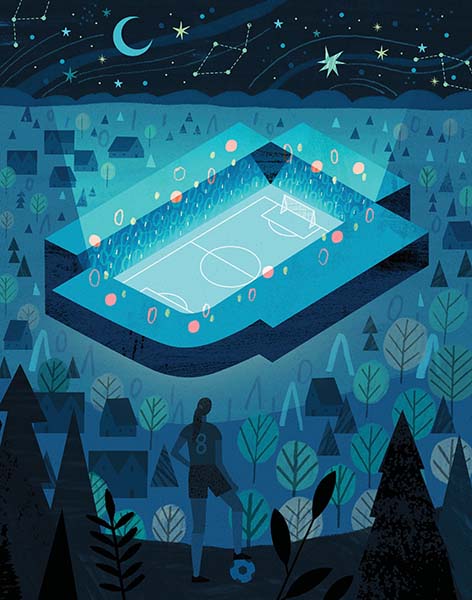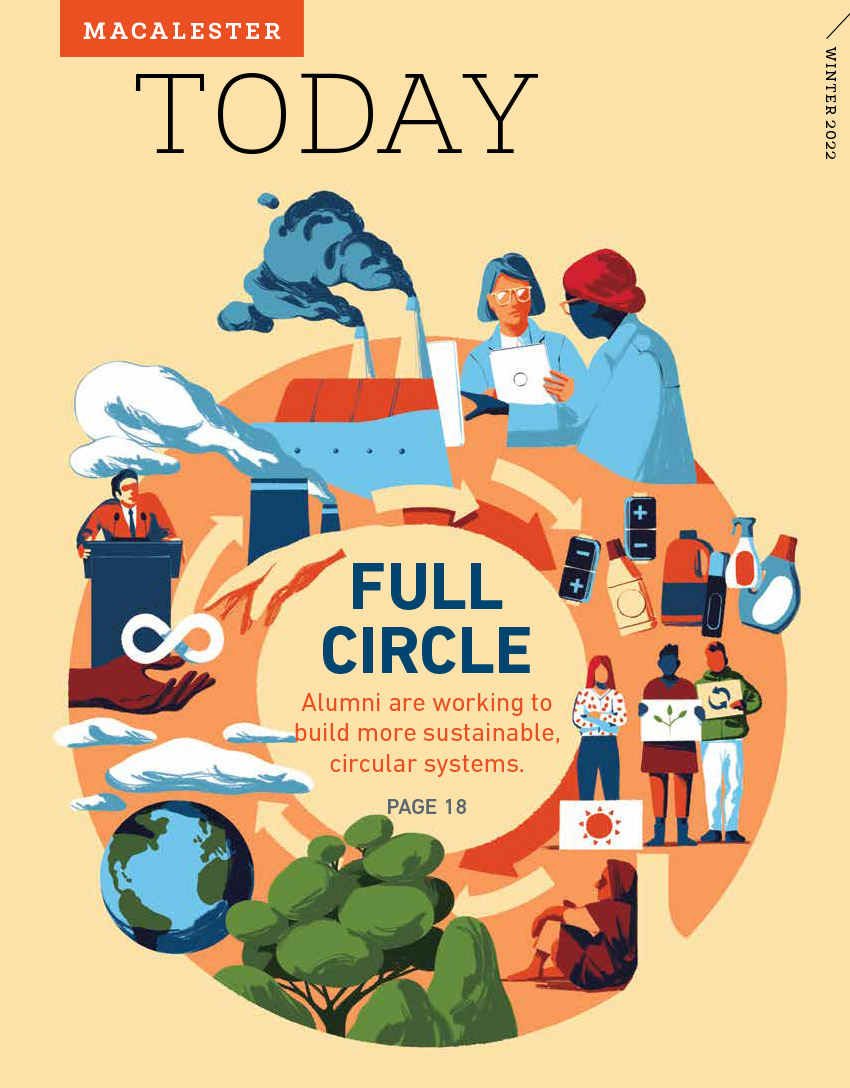
Illustration by Dante Terzigni
After garnering MIAC Player of the Year and All-American honors at Macalester, soccer standout Georgia Cloepfil ’14 embarked on a pro career in Australia, Sweden, South Korea, Lithuania, and Norway. When that chapter began to close, the English major turned to writing to process the transition and move forward.
In 2020, her reflection opened new doors when Cloepfil found out her essay “Lucky to Be Here” had won the literary journal Epiphany’s Breakout 8 Writers Prize. The news came with a surprise Macalester connection: Willard Cook ’79, also a former Mac soccer player, founded the print journal in 2001 while teaching at New York University. Epiphany has since become an independent nonprofit arts organization dedicated to lifting up and creating opportunities for unpublished, emerging, and established writers of diverse backgrounds.
In the past year, Cloepfil expanded her prize-winning essay into her University of Idaho master’s thesis, and she’s shopping around the manuscript while doing a yearlong mentorship with Epiphany editor Rachel Lyon. And although her own competition days are done, she’s back on the soccer field—this time as an assistant coach at Whitman College.
Here, Cloepfil shares an excerpt of “Lucky to Be Here.”

When I was offered the contract in Norway, it was to take the place of a teammate who had torn her ACL and would have to miss the rest of the season. Her name was Freja and she became a close friend. A week after we met, we went on a long hike together. She hadn’t had surgery yet, so she could still walk. By the time we got to the peak she was talking to me about the decisions that lay ahead of her: surgery, rehab, travel, recovery. We sat on a rock that looked out over Bergen. As we talked about her options, she massaged her knee. The city was green and compact and mingled with pockets of ocean. Norway was the most beautiful place I’d ever been. Finally, she said aloud what we both already knew: If I hadn’t gotten injured, you wouldn’t be here. Our opportunities so often come at someone else’s expense. Our fortunes are balanced on a weighted scale.
I had waited a long time to feel professional enough. In Norway I was playing in a top league. My teammates and I had the accommodations we needed. I had a contributing role on the team. We got paid on time, were flown on planes to our games, had lockers in our locker rooms where our jerseys were hung, our names etched onto plaques. Someone did our laundry for us; someone always refilled the snacks. I took a picture each time I saw my carefully folded pile of uniforms in the locker room before a game. The feeling that I would need proof, the feeling that it would all go away.
My dad watched my last-ever professional game in Oslo. I limped through the first sixty minutes, slowly tearing a hamstring. Each sprint was increasingly excruciating. Each time I readied to run I told myself that I’d have no use for my body after this. I wanted to use it all up. By the sixtieth minute I was done. I waved up at him near the stadium’s heights as I limped off and took a seat on the bench. I still struggle to relearn that it is okay to save something for later.
–
After I stop playing, I see another doctor about the knee that has been bothering me now for years. Injections like the ones you were given can cause damage, he says. Many doctors would refuse to administer those injections to someone your age. I nod. I did know this, do know this. I am a different person now, I assure him, laughing. I try to balance my respect for this former self while demonstrating my newfound maturity. I have all the time in the world now. But back then, I tell him, I had to play. I can hear his patience wearing thin when he replies: And many sports medicine doctors would agree that there is no such thing in this world as had to play. It occurs to me that I might still be discovering the extent of my sacrifice, the ways in which my body has been damaged. I am still trying to teach it that I can be kind, I have to remind it that I know and respect its limits, that I want to live a long life together.
The phrase arrival fallacy is used to describe the illusion that once you have accomplished a goal, you will feel satisfied or at peace with where you are, that you will stop desiring. What really happens is that you become adjusted to your new state and a fresh disappointment creeps in. It is hard to distinguish between wanting, the idea of wanting, and the habit of wanting. Is there an end point? Not where one has played the best soccer, but where one has played enough? Throughout my career I sensed there was some threshold I hadn’t crossed, some door I hadn’t yet opened. Behind it, I imagined, was a room in which everything I desired took shape, a room in which I’d have arrived. I thought it would feel like being welcomed into a warm home, fireplace burning, the murmuring voices of everyone I admired. The word arrival is derived from the Latin arripare, to touch the shore after a long voyage. Arrival is an ending, a return. Arrival is coming home.
Landing in Bergen for my final season. The plane dipped down and I felt the shadow of a truth: my days were numbered. At times I really was overwhelmed by unmitigated gratitude. Ambition, negotiation, tough-minded feminism, these gave way to moments of childish joy. I was getting paid to do something I had loved since I was four years old. What else had I loved so unconditionally, for so long? I was so lucky to be here. From the plane I could see green islands scattered across the sea. I marveled at each tree as it came into view, a solid green mass soon recognizable as thousands of individual conifers. I saw soccer fields lit up from above, little beacons announcing themselves over and over again. Four lights and an unnatural green ringed by a track pulsing with activity, even at night when the streets had gone dark. Cars like ants, houses like boxes, people invisible, fields like beacons. The shape, the outline, called to me, still calls. We are here, we are still here.
January 25 2022
Back to top





